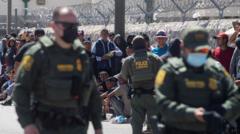Texas officials extend a significant land offer to President-elect Trump for potential migrant detention, emphasizing the state’s support for strict border security measures while facing opposition from some Democratic-led states.
**Texas Proposes Land for Detention Facilities Amid Trump’s Mass Deportation Plans**

**Texas Proposes Land for Detention Facilities Amid Trump’s Mass Deportation Plans**
Texas offers 1,400 acres for facilities to process undocumented migrants, as Trump vows to deport millions.
In a bold move reflecting its commitment to strict immigration policies, Texas authorities have proposed a 1,400-acre plot of land along the U.S.-Mexico border for construction of detention facilities aimed at housing undocumented migrants. The state’s offer comes as President-elect Donald Trump prepares to fulfill his long-standing pledge to deport millions of undocumented immigrants, which he asserts will be supported by mobilizing the National Guard for enforcement.
The land available for this purpose is located in Starr County in the Rio Grande Valley, a strategic point adjacent to the Mexican state of Tamaulipas. Texas General Land Office officials emphasized the suitability of the land, describing it as flat and easier to build upon compared to other locations. The land was previously owned by a person who opposed the construction of a border wall and limited law enforcement access, underscoring potential challenges faced by state efforts to fortify border security.
Dawn Buckingham, Texas Land Commissioner, expressed strong support for Trump's immigration policies, indicating a readiness to collaborate on Trump’s ambitious plans for mass deportation operations. However, this approach has drawn sharp criticism from leaders in Democratic-controlled states such as California, Arizona, and New Mexico, who have expressed their intent not to participate in mass deportation efforts.
Statements from Trump transition team officials indicated a belief that the return of the Trump administration would provide local communities relief from what they term a “border invasion.” Trump's administration previously pursued numerous initiatives to bolster border security, which might lead to newly constructed detention facilities described by team members as potentially being "soft-sided."
Stephen Miller, a senior adviser on immigration in the Trump administration, previously indicated the intention to establish vast holding facilities to serve as staging zones for deportations. Facilities currently in operation vary in nature, from temporary tent structures to more permanent brick-and-mortar buildings managed by Immigration and Customs Enforcement (ICE).
As the nation grapples with divided perspectives on immigration, a recent spending bill under President Joe Biden allocated funds to house a significant number of detainees, although experts caution that Trump’s mass deportation plans could rapidly exceed available capacity. Experts like Adam Isacson highlight that existing statistics indicate an average of over 38,800 detainees, with a substantial portion held within Texas.
This situation underscores an evolving immigration landscape characterized by a "patchwork of protections" that may significantly differ between Republican and Democratic-led states. Analysts suggest that the potential for transporting undocumented migrants from blue states to red states for processing could contribute to growing tension and complex challenges surrounding immigration policy in the United States.
As the discourse surrounding immigration continues, the Texas proposal serves as a focal point for the broader national debate on border security and the future of immigration enforcement strategies.
The land available for this purpose is located in Starr County in the Rio Grande Valley, a strategic point adjacent to the Mexican state of Tamaulipas. Texas General Land Office officials emphasized the suitability of the land, describing it as flat and easier to build upon compared to other locations. The land was previously owned by a person who opposed the construction of a border wall and limited law enforcement access, underscoring potential challenges faced by state efforts to fortify border security.
Dawn Buckingham, Texas Land Commissioner, expressed strong support for Trump's immigration policies, indicating a readiness to collaborate on Trump’s ambitious plans for mass deportation operations. However, this approach has drawn sharp criticism from leaders in Democratic-controlled states such as California, Arizona, and New Mexico, who have expressed their intent not to participate in mass deportation efforts.
Statements from Trump transition team officials indicated a belief that the return of the Trump administration would provide local communities relief from what they term a “border invasion.” Trump's administration previously pursued numerous initiatives to bolster border security, which might lead to newly constructed detention facilities described by team members as potentially being "soft-sided."
Stephen Miller, a senior adviser on immigration in the Trump administration, previously indicated the intention to establish vast holding facilities to serve as staging zones for deportations. Facilities currently in operation vary in nature, from temporary tent structures to more permanent brick-and-mortar buildings managed by Immigration and Customs Enforcement (ICE).
As the nation grapples with divided perspectives on immigration, a recent spending bill under President Joe Biden allocated funds to house a significant number of detainees, although experts caution that Trump’s mass deportation plans could rapidly exceed available capacity. Experts like Adam Isacson highlight that existing statistics indicate an average of over 38,800 detainees, with a substantial portion held within Texas.
This situation underscores an evolving immigration landscape characterized by a "patchwork of protections" that may significantly differ between Republican and Democratic-led states. Analysts suggest that the potential for transporting undocumented migrants from blue states to red states for processing could contribute to growing tension and complex challenges surrounding immigration policy in the United States.
As the discourse surrounding immigration continues, the Texas proposal serves as a focal point for the broader national debate on border security and the future of immigration enforcement strategies.



















